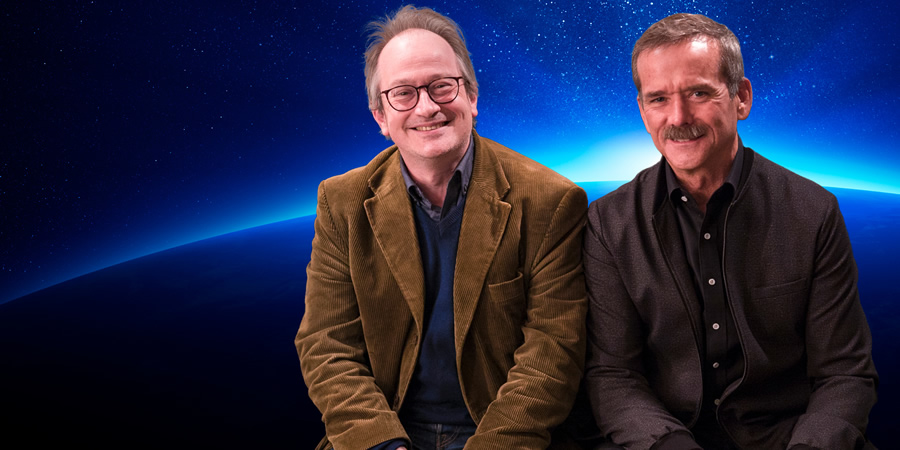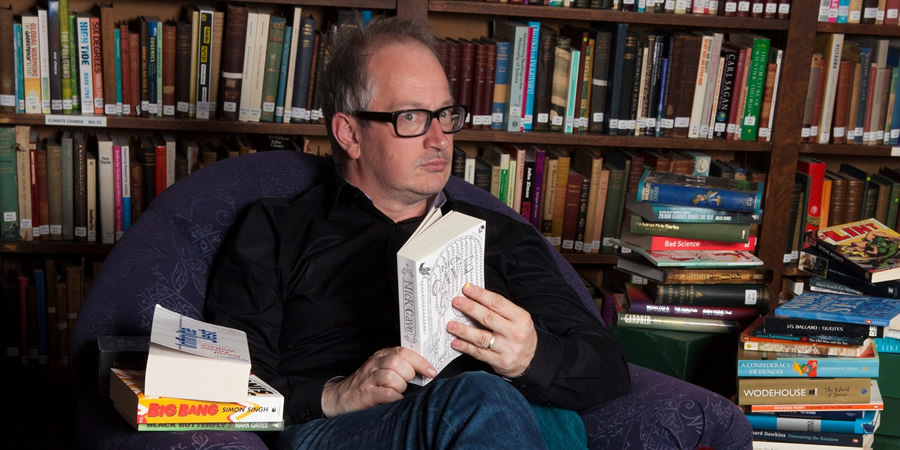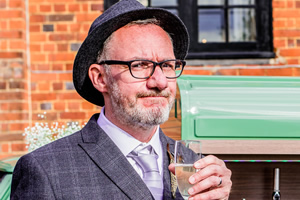
Science Fiction vs Science Fact, with Robin Ince

From Infinity War we head to The Infinite Monkey Cage - or the host of that fine Radio 4 science show, anyway. Robin Ince has a seemingly infinite number of projects going on at any one time, and one particularly stands out right now.
On 15th June at London's illustrious Royal Albert Hall, he's co-hosting Robin Ince and Chris Hadfield's Space Shambles, with the eponymous Canadian astronaut. It's a cornucopia of cosmic stuff, featuring a host of other comedians, astronauts and scientists: the ever-stellar Stewart Lee, Apollo alumni Rusty Schweickart, theoretical physicist Jim Al-Khalili, meteorite specialist Monica Grady, cerebral comics Festival Of The Spoken Nerd, folk-punk singer Grace Petrie, and more to come.
Ince will be at the Albert Hall a fair bit in June, as he and Josie Long will also be doing two special science editions of their Book Shambles podcast at the Elgar Room, on the 4th (with graphic novel legend Alan Moore) and 11th (with graphic web-comments legend Adam Buxton). And if you're a fan of that podcast, you'll know that Ince likes a bit of novel-based sci-fi.
So we wondered: have his views on science fiction changed since he started hanging out with actual scientists? We got his top five sci-fi novels, too.
Speaking of books and launches, Ince will also be hosting one at London's Kings Place on 4th May, for neuroscientist Dr Dean Burnett's tome The Happy Brain, where the duo will discuss what makes us happy. Which does raise the question...
Does sci-fi seem a bit daft, now that you work with scientists so often?
"No, it's the other way around actually. I loved science fiction as a kid and I'm of that generation who had things like Doctor Who, Space 1999, never-ending repeats of Star Trek: what you don't realise is some of the liberal ideology that's in there. And of course, for outsiders - people who don't feel like the schoolyard is for them - these other worlds were a lifebelt.
I went round a Doctor Who convention with my son, and I bumped into Stewart [Lee] and his family - of course we'd be there. And as we wandered around, Stewart and I were both saying, you can still see all of these kids, they're probably not the most popular girls and boys at school, but they've got this thing that unites them. If another kid is into Doctor Who, then they've found common ground, common ground to be that outsider.
And of course with science fiction: Douglas Adams. I think I was 10 or 11 when I bought Hitchhiker's [Guide to the Galaxy], and it was just a fun book to read. Then when you get older you realise that it was based on real scientific ideas. But I don't mind, all I really want from science fiction is a world that seems complete, I'm not really interested in those ones that are just space westerns.
That's why I love Philip K Dick, in a more dystopian way. And people like Harlan Ellison, JG Ballard, some of Margaret Attwood's work, Ursula K Le Guin - she was also interested in anarchy as a political movement. Alan Moore, someone I've worked with - he's interested in anarchy and using the media.
My favourite thing in every artform is: who's stretching it most? And sometimes you watch and you go 'oh, they've stretched it so much, they've broken it.' But I'm glad they've broken it. I don't mind that failure."
Robin Ince's Top 5 Sci-Fi Novels

Roadside Picnic, by Boris and Arkady Strugatsky
I recently read this for the first time: it was the inspiration for Tarkovsky's [classic sci-fi movie] Stalker. It's magnificent and very different, less enigmatic, but nevertheless beguiling and strange. A new favourite.
I Am Legend, by Richard Matheson
They always screw this up when they try to make it into a film, the Will Smith version seems to lose almost every single point of fascination from this masterpiece. Filled with aphorism and hugely suspenseful, I return to it often.
Dr Jekyll and Mr Hyde, by Robert Louis Stevenson
This is a story that opens up so many possibilities, before Freud and Jung, and very different to the many adaptations.
The Three Stigmata of Palmer Eldritch, by Philip K Dick
I could have picked another Philip K Dick, Ubik or Flow My Tears the Policeman Said or... you get the idea. I think this may be the most disconcerting in terms of "what the hell is going on and what world am I in and who am I?" etc. The writings of a man who thought he was sane and decided to project madness onto his long-suffering wives. Anne Dick's memoir is very interesting too.
Because it is so much the start of it all. Like all great imaginative fiction, it does not go when you close the book, it's the opening of many questions of philosophy, ethics and what it is to be thrust into the world without anyone asking your permission. We have no choice. We are here. What next?
Help us publish more great content by becoming a BCG Supporter. You'll be backing our mission to champion, celebrate and promote British comedy in all its forms: past, present and future.
We understand times are tough, but if you believe in the power of laughter we'd be honoured to have you join us. Advertising doesn't cover our costs, so every single donation matters and is put to good use. Thank you.
Love comedy? Find out more
